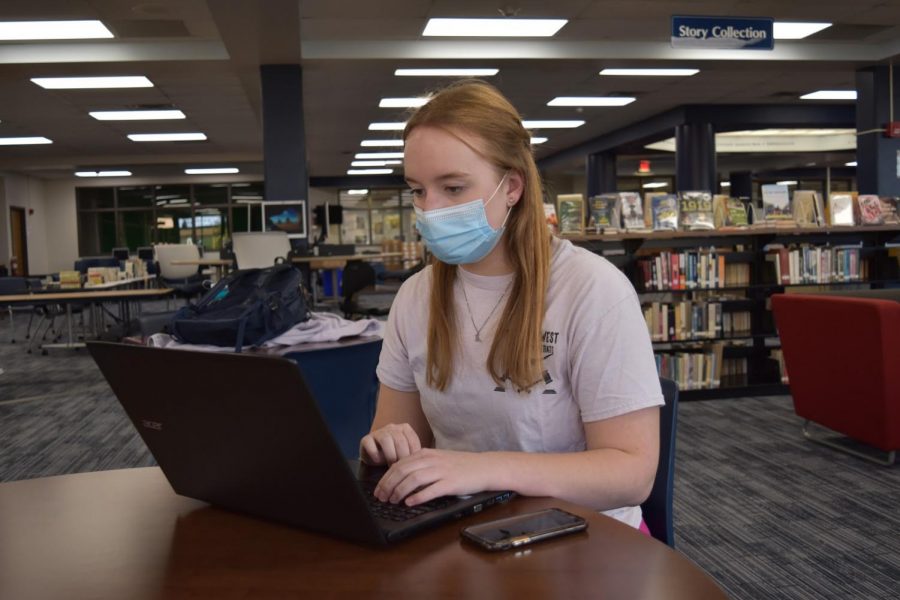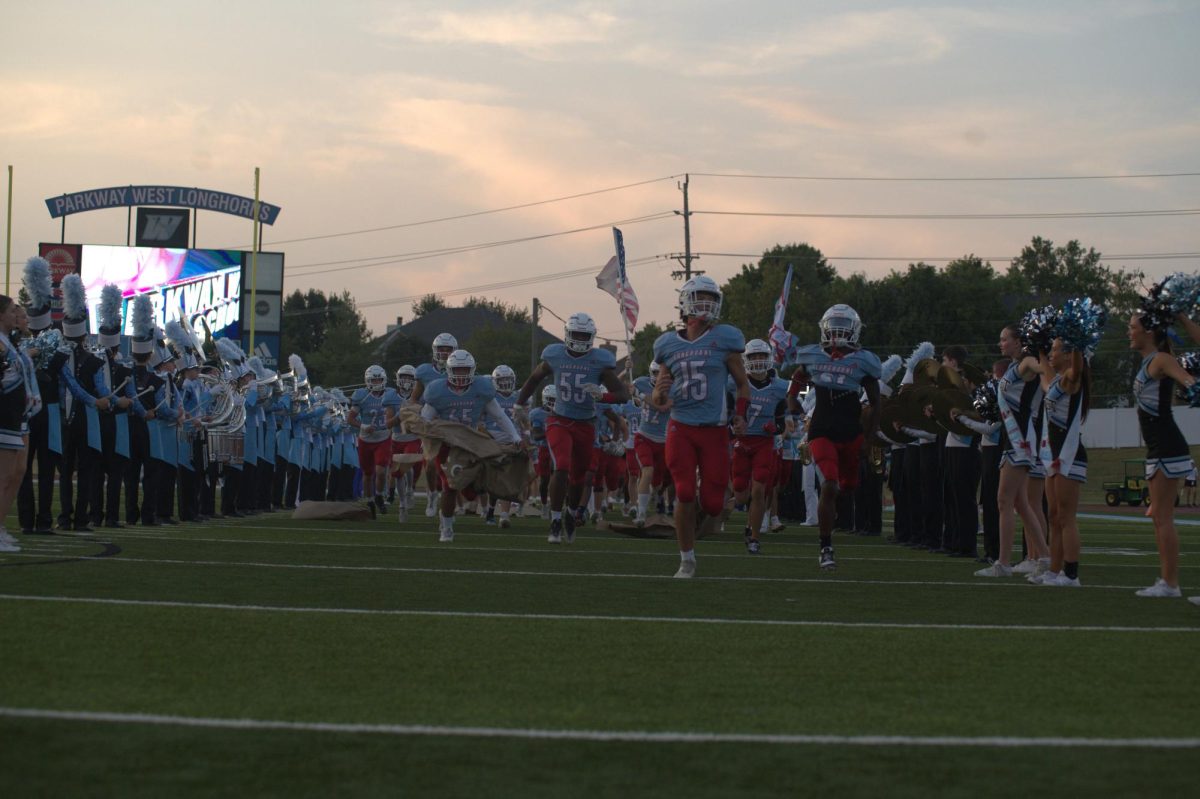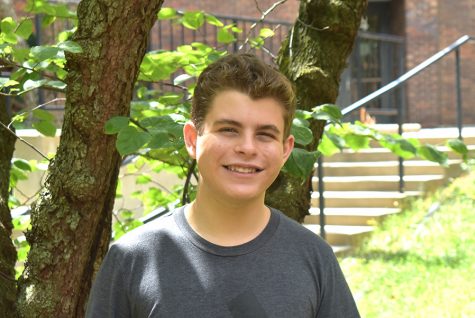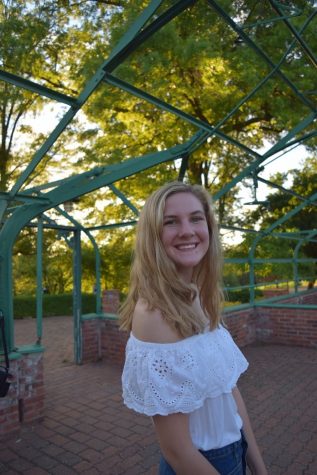Switching from running around rooms, to managing Zooms, the debate team made history by hosting Eastern MissouriŌĆÖs biggest debate tournament, Oct. 6-7. Led by head coach and debate teacher Cara Borgsmiller, members of the team worked together to organize the tournament.
Borgsmiller and the executive board began preparing for the tournament back in August. For Borgsmiller, it felt like she was going back to square one.
ŌĆ£It was like the first few years where I coached, where I didnŌĆÖt know how to delegate work. I had to do a lot of work on my own,ŌĆØ Borgsmiller said.
To host an online tournament with around 400 competitors and more than 300 judges, the team utilized two main programs. Borgsmiller settled on NSDA Campus for Friday and Zoom for Saturday. The tournament required a lot of trial and error.┬Ā
ŌĆ£I found out that we could have done it all on Zoom, and it would have been a lot more efficient,ŌĆØ Borgsmiller said. ŌĆ£It is always so satisfying to finish hostingŌĆōvirtual or not, successful or not. It’s like running a marathon. You put in so much time and work that just finishing the goal you set out for yourself feels tremendous.ŌĆØ
At a traditional in-person tournament, one would see competitors and workers running around, but this time around, the stress was digital.
ŌĆ£Usually, IŌĆÖm always so impressed with my step recorder. If I didnŌĆÖt get to 20,000 steps, then did I really host a debate tournament? This year, I didnŌĆÖt even get to 10,000. I was just as exhausted though. Everything I was managing was mental,ŌĆØ Borgsmiller said.
Keeping track of and communicating with 300 judges was one of the biggest struggles for the team.
ŌĆ£Having to get a hold of a judge or competitor delays everything. Not being in physical spaces with the people I need to communicate with makes it extremely difficult. We were lucky that we were allowed to use the library,ŌĆØ Borgsmiller said.
Senior and executive board member Laura Young was one of the students selected to work in-person at the library. She was in charge of novice public forum, novice oratory and open humorous interpretation.┬Ā
ŌĆ£I ran around, on Zoom, checking virtual rooms and making sure all of the competitors and judges were there,ŌĆØ Young said. ŌĆ£Communication was a lot harder. Whether it was coordinating with judges, my team, or problem solving, it was more difficult to find people and talk out a little problem over Zoom.ŌĆØ
With this season being virtual, team members are finding it harder to form relationships.
ŌĆ£[The virtual season is] sad and IŌĆÖm trying not to think about it because it will make me even sadder. We donŌĆÖt get to go to team dinner. We donŌĆÖt get to stand around and hang out between rounds. We donŌĆÖt get to have our team events,ŌĆØ Young said.
The team has Zoom meetings weekly, and still attend tournaments, but the usual debate traditions have been missing.
ŌĆ£ItŌĆÖs incredibly disappointing. You can look at the makeup of our team and see that a third are seniors. And not just seniors, but four-year seniors who deserve their senior year. IŌĆÖm grateful that we do get an online tournament,ŌĆØ Borgsmiller said.
Borgsmiller says that the team was lucky to be able to meet safely in the library one last time. The team took safety precautions using the district COVID-19 questionnaire, masks and social distancing.┬Ā
ŌĆ£These are people who I’ve gotten very close to over the past four years. At the end of our tournament, usually, we can commiserate together and talk about the tournament and they can go to dinner together. That bonding piece, where you get to meet like-minded people, feels really absent,ŌĆØ Borgsmiller said.
While some seniorŌĆÖs debate careers are ending, others are beginning. Sophomore Esha Francis competed in this tournament for the first time as a novice, with her partner, sophomore Allie Byergo.┬Ā
ŌĆ£I chose Public Forum because I could do it with a partner, and it just felt so interesting. I love talking about and debating about current events. ItŌĆÖs something that IŌĆÖm very passionate about,ŌĆØ Francis said.
Francis and Byergo communicated through FaceTime and Google Docs.
ŌĆ£At one point, my computer broke. I had to speak through AllieŌĆÖs phone into her computer. It modeled how a real round would go. Me and my partner caught on quite quickly and won two of our three rounds. It was a good memory because our problems were shared with our opponents and formed a sense of unity,ŌĆØ Francis said.
Like most debate tournaments, there were technical difficulties; however, this turned out to be a positive for Francis and Byergo.
ŌĆ£After 15 minutes, when no judge showed up, we decided that enough was enough. We were gonna get to know these lovely folks. So we asked them their names and then we started talking. We actually ended up playing ŌĆ£Among UsŌĆØ for about 20 minutes,ŌĆØ Francis said.┬Ā
Borgsmiller is proud of her students who competed or ran the tournament, for rising to the virtual challenge.
ŌĆ£This was a challenge and they rose to it. I think it also shows all my team members that when you dedicate yourself to a cause, no matter how difficult, it is worth it to see it through. I am proud of what they accomplished but also of what was learned: hard work and dedication do pay off,ŌĆØ Borgsmiller said.┬Ā



![Gazing up from the stage, junior Joseph McCurdy who played Peter Pan in the school play, Lost Girl, sits next to senior Juliana Rogers, who plays Wendy Darling, during a theater rehearsal. McCurdyŌĆÖs passion for theater began when he observed a West High production in middle school. ŌĆ£I've been in the high school theater program since I was a freshman. I've always loved theater, but [what prompted me to join] was [when] I went to see [a performance here] when I was in middle school, and it was super cool,ŌĆØ McCurdy said.](https://pwestpathfinder.com/wp-content/uploads/2025/11/IMG_6535-1200x798.jpeg)

![Standing tall, stacked in a precise formation, the cheer team strikes a signature pose during halftime on Sept. 12 at the varsity football game. Nearly a month after this performance, the cheer team performed at the Missouri Cheerleading Coaches Association (MCCA) regional competition on Oct. 4, 2025. ŌĆ£We've all come [to] work together a lot more,ŌĆØ sophomore Elyssa Philippi said. ŌĆ£We're a lot closer than we were [earlier in the season] and going to state has made us closer [in] trying to work with each other, learn [new] skills and make our team better.ŌĆØ](https://pwestpathfinder.com/wp-content/uploads/2025/11/DSC5139-1.jpg)
![Handing out candy to excited trunk-or-treaters, President of the United Nations ChildrenŌĆÖs Fund club and junior Sara Ashok represents that group. Ashok was eager to participate in this event for multiple reasons. ŌĆ£I really wanted to be a part of the event because I get to help create memories for kids and spend time with my friends, spreading the things [I'm passionate about],ŌĆØ Ashok said.](https://pwestpathfinder.com/wp-content/uploads/2025/11/DSC_8648-1-1200x800.jpg)

![Smiling in a sea of Longhorns, Fox 2 reporter Ty Hawkins joins junior Darren Young during the morning Oct. 3 pep rally. The last time West was featured in this segment was 2011. ŌĆ£[I hope people see this and think] if you come to [Parkway] West, you will have the time of your life because there are so many fun activities to do that make it feel like you belong here. I was surprised so many people attended, but it was a lot of fun,ŌĆØ Young said.](https://pwestpathfinder.com/wp-content/uploads/2025/10/Edited2-1200x798.jpg)
![West High seniors and families listen as a representative of The Scholarship Foundation of St. Louis, Teresa Steinkamp, leads a Free Application for Federal Student Aid (FAFSA) workshop. This session, held in the library, provided guidance on financial aid, scholarships and student loan options. ŌĆ£This event is very beneficial for any seniors who are applying to or considering applying to colleges after high school [because] the cost of college is on the rise for seniors and parents,ŌĆØ college and career counselor Chris Lorenz said.](https://pwestpathfinder.com/wp-content/uploads/2025/09/DSC_4478-1200x778.jpg)
![Senior Kamori Berry walks across the field during halftime at the Homecoming football game on Sept. 12. During the pep assembly earlier that day, she was pronounced Homecoming Queen. ŌĆ£I thought it was nice that the crowd [started] cheering right away. I know [my friends] were really excited for me, and my family was happy because typically non-white people don't win,ŌĆØ Berry said.](https://pwestpathfinder.com/wp-content/uploads/2025/09/DSC7046-Enhanced-NR-1200x798.jpg)



![Sophomore Shree Sikkal Kumar serves the ball across the court in a match against Lindbergh. Sikkal Kumar has been a varsity member of the varsity girlsŌĆÖ tennis team for two years, helping her earn the number two rank in Class 2 District 2.ŌĆ£When matches are close, itŌĆÖs easy to get nervous, but I [ground] myself by[staying] confident and ready to play,ŌĆØ Sikkal Kumar said.](https://pwestpathfinder.com/wp-content/uploads/2025/11/DSC2801-1200x798.jpg)
![Dressed up as the varsity girlsŌĆÖ tennis coach Katelyn Arenos, senior Kate Johnson and junior Mireya David hand out candy at West HighŌĆÖs annual trunk or treat event. This year, the trunk or treat was moved inside as a result of adverse weather. ŌĆ£As a senior, I care less about Halloween now. Teachers will bring their kids and families [to WestŌĆÖs Trunk or Treat], but there were fewer [this year] because they just thought it was canceled [due to the] rain. [With] Halloween, I think you care less the older you get,ŌĆØ Johnson said.](https://pwestpathfinder.com/wp-content/uploads/2025/10/DSC00892-1-1200x800.jpg)
![Focused on providing exceptional service, sophomore Darsh Mahapatra carefully cleans the door of a customerŌĆÖs car. Mahapatra has always believed his customers deserve nothing less than the best. ŌĆ£[If] theyŌĆÖre trusting us with their car and our service, then I am convinced that they deserve our 100 percent effort and beyond,ŌĆØ Mahapatra said.](https://pwestpathfinder.com/wp-content/uploads/2025/10/DSC_0018-1200x800.jpg)
![Sophomore Aleix Pi de Cabanyes Navarro (left) finishes up a soccer game while junior Ava Muench (right) warms up for cross country practice. The two came to Parkway West High School as exchange students for the 2025-2026 school year. ŌĆ£The goal for the [exchange] program is to provide opportunities for both Parkway students and our international exchange students to learn about other cultures, build connections and become confident, capable, curious and caring ŌĆö ParkwayŌĆÖs Four CŌĆÖs ŌĆö in the process,ŌĆØ Exchange Program Lead Lauren Farrelly said.](https://pwestpathfinder.com/wp-content/uploads/2025/10/Feature-Photo-1200x800.png)
![Leaning on the podium, superintendent Melissa Schneider speaks to Parkway journalism students during a press conference. Schneider joined Parkway in July after working in the Thompson School District in Colorado. ŌĆ£My plan [to bond with students] is to get things on my calendar as much as possible. For example, being in [classes] is very special to me. I am trying to be opportunistic [meeting] kids [and] being in [the school] buildings. I have all the sports schedules and the fine arts schedules on my calendar, so that when I'm available, I can get to them,ŌĆØ Schneider said.](https://pwestpathfinder.com/wp-content/uploads/2025/09/IMG_5425-1200x943.jpeg)
![Gazing across the stage, sophomore Alexis Monteleone performs in the school theater. The Monteleone familyŌĆÖs band ŌĆ£Monte and the MachineŌĆØ has been releasing music since 2012, but Alexis started her own solo career in 2024 with the release of her first single, Crying Skies. ŌĆ£My whole family is very musical, [and I especially] love writing [songs with them],ŌĆØ Monteleone said.](https://pwestpathfinder.com/wp-content/uploads/2025/09/DSC7463-1200x798.jpg)
![Leaping through the air, senior Tyler Watts celebrates his first goal of the season, which put the Longhorns up 1-0 against the Lafayette Lancers. Watts decided to play soccer for West for his last year of high school and secured a spot on the varsity roster. ŌĆ£[Playing soccer for West] is something I had always dreamed of, but hadnŌĆÖt really had a good opportunity to do until now. ItŌĆÖs [really] fun being out [on the field], and IŌĆÖm glad I decided to join the team. ItŌĆÖs just all about having fun with the boys and enjoying what time we have left together,ŌĆØ Watts said.](https://pwestpathfinder.com/wp-content/uploads/2025/09/DSC_1951-1200x855.jpg)

![Shifting global trade, President Donald TrumpŌĆÖs tariffs are raising concerns about economic stability for the U.S. and other countries alike. ŌĆ£[The tariffs are] going to pose a distinct challenge to the U.S. economy and a challenge to the global economy on the whole because it's going to greatly upset who trades with who and where resources and products are going to come from,ŌĆØ social studies teacher Melvin Trotier said.](https://pwestpathfinder.com/wp-content/uploads/2025/05/MDB_3456-1200x800.jpg)

